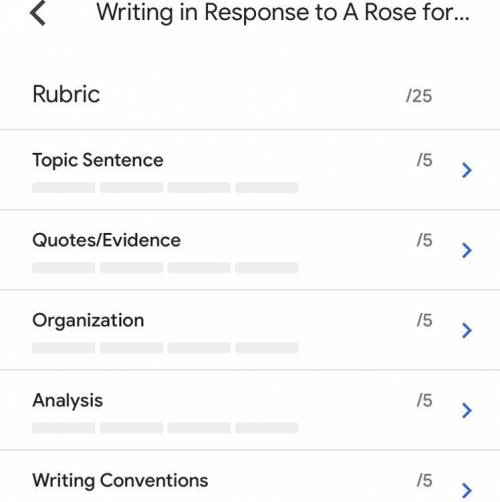
How is Miss Emily “a fallen monument” (para 1)? To what is she a monument? Why does the narrator repeatedly call an Emily an “idol”? What connection can you draw between these images and one of the story’s themes? Discuss with fully developed details from the text. Direct textual quotes required. _


Answers: 2
Other questions on the subject: English

English, 21.06.2019 21:20, BluSeaa
Read the sentences below and complete the instruction that follows. the coach, who has ten years' experience, has agreed to lead our team. the coach who has ten years' experience has agreed to lead our team. select the answer that explains the difference between the two sentences, as well as the purpose each clause serves for the benefit of the reader. a.) the first sentence contains a noun clause that functions as a predicate nominative; therefore, it renames the subject of the sentence for the reader. the second sentence contains an essential adjective clause that modifies the noun "coach"; therefore, it clarifies for the reader which coach is being discussed. b.) the first sentence contains a nonessential adjective clause that modifies the noun "coach"; therefore, it provides the reader with interesting details about the subject of the sentence. the second sentence contains an essential adjective clause that modifies the noun "coach"; therefore, it clarifies for the reader which coach is being discussed. c.) the first sentence contains a nonessential adjective clause that modifies the noun "coach"; therefore, it provides the reader with interesting details about the subject of the sentence. the second sentence contains a noun clause that functions as a predicate nominative; therefore, it renames the subject of the sentence for the reader. d.) the first sentence contains an adverb clause that modifies the verb "agreed"; therefore, it provides the reader with the answer to the question "when." the second sentence contains an essential adjective clause that modifies the noun "coach"; therefore, it clarifies for the reader which coach is being discussed.
Answers: 1

English, 21.06.2019 23:30, delayne22
Select the correct answer. read this excerpt from incidents in the life of a slave girl by harriet ann jacobs: among the ladies who were acquainted with my grandmother, was one who had known her from childhood, and always been very friendly to her. she had also known my mother and her children, and felt interested for them. at this crisis of affairs she called to see my grandmother, as she not unfrequently did. she observed the sad and troubled expression of her face, and asked if she knew where linda was, and whether she was safe. my grandmother shook her head, without answering. "come, aunt martha," said the kind lady, "tell me all about it. perhaps i can do something to you." which of these important concepts uncommon to abolitionist literature does jacobs depict in the excerpt? 1. some kind white characters were included in slave narratives so that northerners would not be offended. 2. southern society was complex and diverse with both good and bad people unlike northern stereotypes showed. 3. many kind slave owners and their slaves developed deep friendships. 4. most whites and blacks lived in harmony in the south and made efforts to each other. a. 1 and 4 b. 1 and 3 c. 1 and 2 d. 2 and 3
Answers: 3

English, 22.06.2019 02:40, itzhari101
Julius caesar. [brutus.] with this, she fell distraught, and, her attendants absent, swallowed fire. cassius. and died so? brutus. even so. cassius. o ye immortal gods! [enter lucius, with wine and taper] brutus. speak no more of her. give me a bowl of wine. in this i bury all unkindness, cassius. cassius. my heart is thirsty for that noble pledge. fill, lucius, till the wine o'erswell the cup; i cannot drink too much of brutus' love. [exit lucius. enter titinius, with messala] brutus. come in, titinius; welcome, good messala. now sit we close about this taper here, and call in question our necessities. cassius. portia, art thou gone? brutus. no more, i pray you. what moral dilemma does brutus confront in this excerpt? brutus lets go of his anger toward cassius and forgives him. brutus decides that he will not mourn portia and will stay loyal to cassius. brutus decides that he is too angry at cassius to remain friends with him. brutus questions whether cassius's life should be ended.
Answers: 3

English, 22.06.2019 03:10, cheating53
Identify the participle or infinitive phrase in the sentence below
Answers: 3
Do you know the correct answer?
How is Miss Emily “a fallen monument” (para 1)? To what is she a monument? Why does the narrator rep...
Questions in other subjects:






Biology, 11.09.2019 00:30










